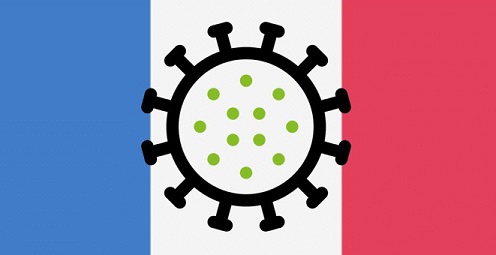Nikhil Prasad Fact checked by:Thailand Medical News Team Oct 05, 2024 1 year, 3 months, 3 days, 55 minutes ago
Medical News: France is witnessing a notable increase in COVID-19 infections as the latest data reveals a steady upward trend in cases across the country. Public health authorities are closely monitoring the situation, with concerns heightened as the virus's circulation intensifies, particularly among older adults. This Medical News report will explore the current state of COVID-19 in France, emphasizing the importance of preventive measures, vaccinations, and the research behind these findings.
 COVID-19 Infections Rising in France
COVID-19 Cases on the Rise
COVID-19 Infections Rising in France
COVID-19 Cases on the Rise
In the week of September 16-22, 2024 (Week 38), the latest report from Santé Publique France highlights a worrying rise in COVID-19 indicators. The report shows an increase in COVID-19 activity both in hospitals and in general medical practice across all age groups, with adults, particularly those over 65 years old, being the most affected.
For the fourth consecutive week, France’s wastewater surveillance system, which detects the presence of SARS-CoV-2 in sewage, has shown a rise in viral concentration. This trend suggests that the virus is spreading more widely, and experts warn that this could be the beginning of a larger wave of infections. Close monitoring will be essential over the coming weeks to assess the full extent of this resurgence.
Key Indicators of the Current Situation
Several important indicators have increased in recent weeks, showing a clear uptick in COVID-19 activity:
-Medical Visits: During Week 38, 4% of all SOS Médecins (emergency medical services) consultations were for suspected COVID-19 cases, up from 2.8% in Week 37. The increase was particularly pronounced among adults aged 65 and older, with 4.8% of medical visits in this group being for suspected COVID-19, compared to 2.6% the previous week. Younger age groups, including children aged 5-14, also saw slight increases in suspected COVID-19 consultations.
-Hospital Visits: Hospital emergency room visits for suspected COVID-19 also rose, with 0.9% of all ER visits being related to COVID-19 in Week 38, up from 0.6% the previous week. Of these cases, 1.8% resulted in hospitalizations, marking a significant jump from the previous week’s 1.1%.
-Testing Positivity: COVID-19 testing data also indicates a rising trend, with the positivity rate for tests conducted in medical labs increasing to 29% in Week 38 from 24.3% in Week 37. In hospital settings, the positivity rate grew to 15.3% from 12.6%.
These indicators, along with wastewater data, paint a concerning picture of the virus’s continued spread. The rise in COVID-19 cases appears to be driven by a combination of factors, including increased transmission in the community and waning immunity among older populations.
https://www.santepubliquefrance.fr/maladies-et-traumatismes/maladies-et-infections-respiratoires/covid-19/documents/b
ulletin-national/covid-19-en-france.-point-au-25-septembre-2024
The Importance of Preventive Measures
Even with the ongoing vaccination efforts, public health authorities stress that preventive measures remain crucial in curbing the spread of COVID-19. Simple actions, such as wearing a mask in crowded places and practicing regular hand hygiene, can significantly reduce the risk of transmission. For individuals experiencing symptoms of respiratory illness, staying home and avoiding contact with others is essential to prevent further spread, particularly to vulnerable groups such as the elderly and those with weakened immune systems.
The rise in cases serves as a reminder that COVID-19 is still a threat, and vigilance is required to avoid another widespread outbreak. Public health experts are urging the public to continue following recommended guidelines to protect themselves and those around them.
Virological Surveillance and the Dominance of the JN.1 Variant
The virological surveillance data from Santé Publique France also sheds light on the variants of the virus currently circulating in the country. The JN.1 variant has become the dominant strain in France, accounting for over 99% of the sequences analyzed during the most recent Flash Survey conducted on September 2, 2024. This variant, along with its sublineages, has been driving the recent increase in cases.
Among the sublineages of JN.1, the KP.3.1.1 variant has seen a particularly rapid rise in prevalence, representing 67% of the sequences in the latest survey. Other sublineages are also circulating, but KP.3.1.1 is currently the most widespread. Ongoing genomic surveillance will be crucial in tracking the evolution of these variants and understanding their impact on the spread of the virus.
The Role of Wastewater Surveillance
One of the key tools used to monitor the spread of COVID-19 in France is wastewater surveillance. This method, which involves testing sewage for traces of the virus, provides a reliable early warning system for detecting increases in viral circulation. In Week 38, all 12 wastewater treatment plants monitored in France reported rising levels of SARS-CoV-2, with viral concentrations increasing by 36.3% compared to the previous week.
Wastewater surveillance has proven to be a valuable indicator of COVID-19 trends, often detecting rises in cases before they are reflected in clinical data. This allows public health officials to respond more quickly to emerging outbreaks and take necessary preventive actions.
Conclusion: A Call for Continued Vigilance
As COVID-19 infections continue to rise in France, particularly among older adults, the importance of preventive measures and vaccinations cannot be overstated. The current increase in cases is a stark reminder that the virus is still circulating and poses a risk to vulnerable populations. With the JN.1 variant dominating the landscape and its sublineages on the rise, ongoing surveillance and public health efforts will be critical in managing the spread of the virus.
As the situation evolves, public health authorities will be closely monitoring the data to ensure that appropriate actions are taken to protect the population.
In conclusion, while the rise in cases is concerning, there are steps that can be taken to mitigate the impact of the virus. By remaining vigilant, following public health guidelines, France can continue to manage the ongoing COVID-19 challenge.
For the latest COVID-19 News, keep on logging to Thailand
Medical News.
Read Also:
https://www.thailandmedical.news/news/covid-19-surge-in-the-czech-republic-with-over-1,900-cases-daily-and-50-deaths-in-september
https://www.thailandmedical.news/news/covid-19-positivity-rate-rises-to-11-8-percent-across-the-united-kingdom-as-xec-variant-starts-its-autumn-rampage
